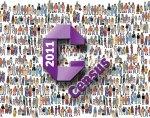 The release of new figures about the ‘ethnic minority’ population from the 2011 census this morning means that the extent of disproportionate discrimination and inequality has officially risen.
The release of new figures about the ‘ethnic minority’ population from the 2011 census this morning means that the extent of disproportionate discrimination and inequality has officially risen.
No wonder, then, that the 2011 census is to be the last of its’ kind. The census, that takes place every decade, is to be abandoned. And as a result no longer shall we be able to accurately measure the extent of institutional racism in years to come.
The total African, Caribbean and Black mixed population now stands at five percent, up from 3.2 percent in 2001 and 3.6 percent based on 2009 figures.
We current have nine MPs of African or Caribbean heritage. On past census figures that meant we needed 25 Black MPs – almost three times as many – to reflect society.
Using today’s census data I calculate that it would take 34 Black MPs to reflect society. The Commons now needs four times as many Black MPs than at present.
In the Lords there are eleven peers of African or Caribbean family background out of 760 members of the Upper House. On the old census that meant we needed 26 Black peers. Today we need 39.
So overall, comparing the general population against the proportion of Black parliamentarians, we have gone from being 34 short to 53 short. And at the current rate of progress it will take a significantly longer time to achieve progress.
No wonder these are the last census figures. With the rate of growth of Black communities a census in 2021 would no doubt have shown Britain going even further backwards when it comes to race equality.
On criminal justice, the Equality and Human Rights Commission (EHRC) found earlier this year that Black youth were 28 times more likely to be stopped and searched under Section 60 powers, which are the modern-day Sus Laws whereby police can stop people without suspicion of a crime being committed.
The new census figures mean that Black youth are today 43 times more likely to be stopped and searched than their white counterparts.
Black people were already more likely to be in prison in Britain than the United States.
Based on the previous figure that the Black population was 2.2 percent the EHRC calculated that Black Brits were five times more likely to be imprisoned than white people.
Today, using 2011 data, Black people are over eleven times more likely to be imprisoned.
The same calculation can be made across numerous social statistics pointing to racial dis-proportionality and grossly unequal outcomes affecting Black people in Britain today.
Overall it strengthens the call for more serious government action to tackle race inequality, and I believe it adds wind to the sails of the call for Affirmative Action.
Unless the rate of progress can be speeded up – and in many respects we have fallen backwards in recent times – then we will continue to become an even more unequal society divided along race lines.
By Lester Holloway @brolezholloway
